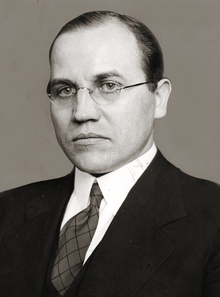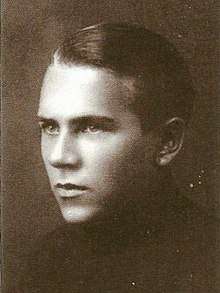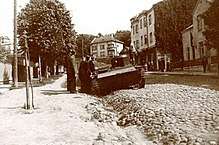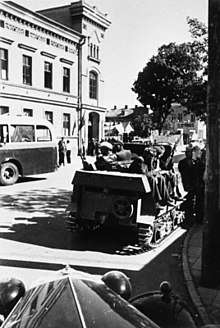Lithuanian Activist Front
Lithuanian Activist Front or LAF (Lithuanian: Lietuvos Aktyvistų Frontas) was a short-lived resistance organization established in 1940 after Lithuania was occupied by the Soviet Union. The goal of the organization was to liberate Lithuania and re-establish its independence. It planned and executed the June Uprising and established the short-lived Provisional Government of Lithuania. The Government self-disbanded and LAF was banned by Nazi authorities in September 1941. LAF remains controversial due to its anti-Semitic and anti-Polish positions.
Under the USSR

LAF was established on 17 November 1940.[1] Kazys Škirpa, former Lithuanian military attaché to Germany, is often credited as the founder.[1] LAF was meant to unite people of various political beliefs, who wanted to see Lithuania as an independent country, rather than as part of the Soviet Union or Nazi Germany.[2] The Berlin unit, formed by Kazys Škirpa, united mainly former Lithuanian expatriates and diplomats in Germany. It gathered representatives of most major pre-war Lithuanian factions and parties, and within LAF, the most influential were the Nationalist Unionists and the Christian Democrats.[1]
As time passed, local LAF units were formed in various Lithuanian cities. The local LAF units were organizing espionage networks.[1] The local LAF units in Lithuanian cities maintained more liberal political views than the Berlin headquarters. Lack of correspondence between the Berlin unit and Lithuanian units prevented discussions of ideology. In Germany, LAF had contact with Wilhelm Franz Canaris and Abwehr, but not the Nazi party. LAF expected that Nazi Germany would attack the Soviet Union and planned to use this occasion for their own rebellion and establishment of independent Lithuania.
On 22 April 1941, representatives of Vilnius and Kaunas branches of LAF formed the Provisional Government of Lithuania, i.e. established a list of its members.[3] LAF formed the Lithuanian underground government planning to take over the country when the Soviet army would be pushed out by the German army. The Provisional Government was mainly formed out of Vilnius and Kaunas sections of LAF. However, two of its members, including the prime minister Kazys Škirpa, were in Germany and were later detained there. Over time, many people from this government, as well as other LAF members, were arrested, executed, or exiled by Soviet authorities.
June Uprising



Germany declared war on the Soviet Union on June 22, 1941, and the same day LAF started the June Uprising. LAF partisans aided the Germans. The next day, June 23, independence of Lithuania was declared. In whole Lithuania about 10 000 people participated in June Uprising, 700 of them were killed by retreating Soviet army. LAF freed 3336 political prisoners, detained by the Soviets.[4] Short-handed Provisional Government took power on June 24. On June 21 four members of the government were arrested by the Soviet authorities, supposed prime minister Kazys Škirpa was put under house arrest in Berlin, and another minister was also unable to come. Juozas Ambrazevičius became the prime minister.
However, the negotiations with Germany over the recognition of Lithuania failed, as Nazi government had no interest in an independent Lithuania. General feldmarschall Walther von Brauchitsch issued a directive on 26 June 1941 to the commander of Army Group North, under which "small armed Lithuanian groups and Lithuanian police" should be disarmed and sent to the concentration camps.[5] Disarmament of LAF activists started by Wehrmacht in Kaunas on June 26 and lasted till 28 of June. Last LAF activists were disarmed in Zarasai and Obeliai on 28-29 of June. The German authorities did not use brutal force against its members. Rather, they established their own administrative structures (Reichskommissariat Ostland) and slowly deprived the government of its powers. The government lost all of its power in a few weeks, and seeing no more reason to continue work, dissolved itself in August 1941. LAF as an organization remained. On 15 of September it sent a memorandum About the status of Lithuania after the German Civil Administration started to operate (Apie Lietuvos būklę, vokiečių civilinei administracijai pradėjus veikti)[6] to Germany protesting against the occupation of Lithuania and expressing hopes that Germany would not extend its territory at expense of Lithuania. In response, the Lithuanian Activist Front was banned on September 26; its property confiscated, and its leader Leonas Prapuolenis was arrested and sent to Dachau concentration camp. Other members like Pilypas Narutis-Žukauskas, Petras Paulaitis joined anti-nazi resistance.
Controversy

The LAF is a controversial organization because of its anti-Semitic[7] and anti-Polish[1] views and overall collaboration with the Nazi Germany. For example, LAF's manifesto-type essay "What Are the Activists Fighting for?" states: "The Lithuanian Activist Front, by restoring the new Lithuania, is determined to carry out an immediate and fundamental purging of the Lithuanian nation and its land of Jews ...".[8] The LAF's pro-Nazi rhetoric and stridently anti-Semitic propaganda that equated Jews with Bolshevism and was widely disseminated in Lithuania prior to and during the June uprising likely encouraged the local population to engage in mass violence against Jews that began prior to the arrival of Nazi forces in the country and continued during the Nazi occupation (1941-1945).
More than 95% of Lithuania's Jewish population was massacred during the Nazi occupation—a more complete destruction than befell any other country affected by the Holocaust. Historians attribute this to the massive collaboration in the genocide by the non-Jewish local paramilitaries, though the reasons for this collaboration are still debated.[11][12][13][14] The Holocaust resulted in the largest-ever loss of life in so short a period of time in the history of Lithuania.[14]
The goal of the June uprising organized by the LAF was to seize control of Lithuania as Soviet forces retreated in the face of Germany's attack. During the June uprising, LAF paramilitaries committed many atrocities (rapes, murders, pillage). Even the Germans referred to these "allies" as "organized robbers".[1] Also, a number of acts issued by the LAF-instituted Provisional Government of Lithuania discriminated against Jews, one notable example being "Žydų padėties nuostatai" (English: Regulation on Status of Jews), which according to some authors were never actually adopted and only considered by the Provisional Government.[15] The LAF did unsuccessfully attempt to stop a pogrom organized by Algirdas Klimaitis in Vilijampolė.[16] Upon hearing that Klimaitis was to start a pogrom in Vilijampole suburb on June 25, the LAF staff in Kaunas unsuccessfully attempted to stop him. Later, the Provisional Government of Lithuania detailed Generals Reklaitis and Pundzevičius of the LAF Defense Committee to confer with him. Wearing a Lithuanian flag draped across his chest, Klimaitis met the two former Lithuanians generals and unsuccessfully attempted to justify his actions. The generals succeeded in convincing this upstart that his actions were darkening the Lithuanian name and that he was doing the Nazis' dirty work for them.[16]
Among the initial tactics of Nazi authorities was to surreptitiously encourage and involve the local population in attacks on Jews. These tactics are well disclosed in the Schutzstaffel General Brigadeführer and Security Police Chief of the Occupied Eastern Territories Franz Walter Stahlecker 1941 X.15 report to the Reich Minister Heinrich Himmler. In his report to Heinrich Himmler about his tasks (the extermination of Jews in the Baltic states) execution, Franz Walter Stahlecker states that the extermination of Jews in the Wehrmacht occupied territories should be performed in a way that the Nazis would remain "clean" in front of the history and that there would be no sign of Nazis actual inspiration, organization or conducting, and it should look like that the local population and its institutions in their own initiative performed the execution of the Jewish population.[17][18][19][20]
— Henry A. Zeiger, citing the General Franz Walter Stahlecker report 1941.X.15 to the Reich Minister Heinrich Himmler.[21][18]
— Philip Friedman, citing other words from the same SS Brigadeführer Franz Stahlecker, Commander of Eisatzgruppe A, operating in Baltic countries report.[21][19]
— Philip Friedman, describing the Lithuanians cooperation with Nazis.[21][19]
In this regard, the LAF and its paramilitaries initially proved handy. Meanwhile, the LAF-established Provisional Government of Lithuania did little to oppose the anti-Jewish violence and murder carried out by the Nazis and their local collaborators. Its main goal was to protect ethnic Lithuanians and reestablish an independent Lithuania under the patronage of Nazi Germany. Lithuanian Minister of National Defence General Stasys Raštikis (former Commander of the Lithuanian Army) met personally with the Nazi Germany Generals to discuss anti-Jewish violence.[22] He approached the Kaunas War Field Commandant General Robert von Pohl and the Commander of Army Group North Rear Area General Franz von Roques by trying to plead on behalf of the Jews, however they replied that the Gestapo is handling these issues and that they cannot help.[23]
— Lithuanian Minister of National Defence of the Provisional Government General Stasys Raštikis, about his conversation with the Jewish delegation, which consisted of the Former Chief Rabbi of the Lithuanian Armed Forces Samuelis Sniegas and Reserve lieutenant Goldberg (who was previously imprisoned by the Soviets due to his relations with the Lithuanian Army), during their visit to his house asking to facilitate their situation in the ghetto.[21][24]
"You (Lithuanians) are not yet used to it, but you will have to get used to it", the host interrupted in my narration.
"No, Mr. General, we will not get used to it", I replied.
"But it is performed not by the German Army, but by the Gestapo".
"Yes, Mr. General, but our Government and me myself think that now, during the war, and especially in Lithuania, which currently is in the closest military actions back, the military authority has not only the biggest, but also the highest power . . . That is why I arrived to You to express our greatest dissatisfaction and concern in this matter and to demand that the campaign against Jews in Kaunas and in the province now be stopped".
I saw that the general did not liked my statement, but he quickly have taken hold and started to make excuses that it is Gestapo workspace . . . General von Pohl agreed to my thought that this Gestapo action is exciting for the local Lithuanian residents. After a longer conversation, the host declared that about the Lithuanians moods and my statement he will inform the higher institutions. The conversation finished in this way . . . But by saying goodbye, gen. von Roques all unexpectedly poured cold water on my head. By saying goodbye and giving his hand to me, he declared:
"Mr. General, do not worry and don’t be concerned, this action will end soon."
It means, the senior military commander in Lithuania was speaking not about the suspension of the action, but about its ending . . .
I was not able to report the Prime Minister about anything joyful, because of the General von Roques sentence that slipped from his lips that the Gestapo action against Jews will end soon. It did not said anything good, because it was possible to understand that the provided number of Jews will soon be destroyed . . .
After a few days, during the visit of the Rabbi Samuelis Sniegas, I was only able to tell that I tried to win something in this matter in the German Military Command, however from what I was able to experience, we cannot do any optimistic conclusions."— Lithuanian Minister of National Defence of the Provisional Government General Stasys Raštikis, about his visit to the Nazi Generals due to the Jewish people situation.[21][25]


At the beginning of the occupation, Acting Prime Minister of the Provisional Government of Lithuania Juozas Ambrazevičius (a.k.a., Juozas Brazaitis) convened a meeting in which cabinet ministers participated together with former President Kazys Grinius, Bishop Vincentas Brizgys and others.
Ministers expressed distress at the atrocities being committed against the Jews, but advised only that "despite all the measures which must be taken against the Jews for their Communist activity and harm done to the German Army, partisans and individuals should avoid public executions of Jews."[26] According to Lithuanian-American Holocaust historian Saulius Sužiedėlis, "none of this amounted to a public scolding which alone could have persuaded at least some of the Lithuanians who had volunteered or been co-opted into participating in the killings to rethink their behavior." Lithuanian paramilitary battalions formed by the LAF and Provisional Government (known as Lithuanian TDA Battalions) were eventually enlisted by the Nazis to help carry out the Holocaust.[27]
The Reichskommissariat Ostland, German Civil Administration (Zivilverwaltung) was established on July 17.[28] Instead of using brute force, the Civil Administration slowly removed the government's powers (for example, did not allow to print its decrees in newspapers or broadcast radio announcements) and supplanted its institutions, forcing the Provisional Government to either self-disband or to become a puppet institution.[29] Willing to cooperate if that meant recognition and some semblance to autonomy, the government did not agree to become an instrument of German occupation.[29] The government self-disbanded on August 5 after signing a protest for the Germans actions of suspending the Lithuanian Government powers. Members of the Provisional Government then in corpore went to the Garden of the Vytautas the Great War Museum, where they laid wreath near the Tomb of the Unknown Soldier in the presence of numerous audience. Sicherheitsdienst confiscated the pictures of the wreath-laying ceremony, thinking that it could be dangerous for the German occupation policy in Lithuania.[30]
The Lithuanian TDA Battalions were soon taken over by Nazi officials and reorganized into the Lithuanian Auxiliary Police Battalions (Lithuanian version of Schutzmannschaft).[31] The original TDA eventually became the 12th and the 13th Police Battalions. These two units took an active role in mass killings of the Jews in Lithuania and Belarus.[32] Based on the Jäger Report, members of TDA murdered about 26,000 Jews between July and December 1941.[33]
Later Juozas Ambrazevičius actively participated in the anti-Nazi underground, four members of the Provisional Government were imprisoned in the Nazi concentration camps.[34]
There are allegations by certain journalists that, in 1973, a Committee of the United States Congress made conclusions that there is no Prime Minister of the Provisional Government Juozas Ambrazevičius' and Jonas Šlepetys' guilty in the Holocaust in Lithuania.[35][36][37] It is also known that in the summer of 1944 Ambrazevičius left for Germany, and in 1948 for the United States, where he edited a Catholic daily, Darbininkas, and continued his work in the Supreme Committee for the Liberation of Lithuania in exile. He published a number of leaflets illustrating German and Soviet crimes in Lithuania and the Lithuanian resistance, for example, In the Name of the Lithuanian People (1946) and Appeal to the United Nations on Genocide (1951). In 1964 he published a book Alone, all alone about the Lithuanian armed resistance. The Kremlin actively opposed his activities. In the 1970s he became a subject of interest for the Soviet media and American hunters of Nazi colloborators, who accused him of having worked for the Third Reich. In reply, he published an extensive dossier of his World War II activities.[38]
During the 2012 reburial ceremony of the Juozas Ambrazevičius remains in Kaunas, adviser to Lithuanian Prime Minister Andrius Kubilius also noted that a 1975 investigation by US Immigration found no evidence of Ambrazevičius/Brazaitis being involved in anti-Semitic or pro-Nazi activities.[39] However, according to a subsequent clarification issued in 2019 by the Foreign Affairs Committee of the US Congress, the investigation was not conclusive and did not amount to a "rehabilitation" of Ambrazevičius/Brazaitis. The investigation into his wartime activities was discontinued after Ambrazevičius/Brazaitis passed away in 1974.[40]
References
- Tadeusz Piotrowski, Poland's Holocaust, McFarland & Company, 1997, ISBN 0-7864-0371-3, Google Print, pp. 163-168
- Bradley Campbell, The Geometry of Genocide: A Study in Pure Sociology, University of Virginia Press, 2015, ISBN 978-08-13-93742-7, p. 179.
- Sigitas Jegelevičius. 1941 m. Lietuvos laikinosios vyriausybės atsiradimo aplinkybės (Circumstances of establishing provisional government of Lithuania in 1941), Voruta, No. 11 (557), June 11, 2004 Archived May 7, 2006, at the Wayback Machine
- Tamakauskas, Zigmas. "1941 metų Birželio sukilimo žingsnių aidas" (in Lithuanian). Retrieved 13 October 2019.
- Vitkus, Zigma. "Sigitas Jegelevičius: „Birželio sukilimą šiandien dažnai matome pro sovietinės propagandos akinius" (I)" (in Lithuanian). Retrieved 6 October 2019.
- "Kai kurie slapto ir viešo Pasipriešinimo bruožai 1940-1942m. dokumentuose - ANTINACINĖ REZISTENCIJA". www.partizanai.org (in Lithuanian). Retrieved 12 October 2019.
- Sakowicz, Kazimierz (2008). Ponary Diary, 1941-1943: A Bystander's Account of a Mass Murder. Yale University Press. pp. 2–3. ISBN 9780300129175.
- "The Murder of the Jews in German-Occupied Lithuania." Paper by Yitzhak Arad delivered at the international conferences in Nida (1997) and Telsiai (2001) on "The Vanished World of Lithuanian Jews." https://books.google.com/books?id=mdXRKbcyi5oC page 191
- In Truska, Liudas and Vareikis, Vygantas. Preconditions for the Holocaust: Anti-Semitism in Lithuania: Second Half of the 19th Century–June 1941. Margi Raštai, Vilnius (2004). pp. 309–311.
- In Truska, Liudas and Vareikis, Vygantas. Preconditions for the Holocaust: Anti-Semitism in Lithuania: Second Half of the 19th Century–June 1941. Margi Raštai, Vilnius (2004). pp. 268–269.
- Daniel Brook, "Double Genocide. Lithuania wants to erase its ugly history of Nazi collaboration—by accusing Jewish partisans who fought the Germans of war crimes.", Slate, July 26, 2015
- Porat, Dina (2002). "The Holocaust in Lithuania: Some Unique Aspects". In David Cesarani (ed.). The Final Solution: Origins and Implementation. Routledge. pp. 161–162. ISBN 978-0-415-15232-7.
- MacQueen, Michael (1998). "The Context of Mass Destruction: Agents and Prerequisites of the Holocaust in Lithuania". Holocaust and Genocide Studies. 12 (1): 27–48. doi:10.1093/hgs/12.1.27. ISSN 8756-6583.
- Bubnys, Arūnas (2004). "Holocaust in Lithuania: An Outline of the Major Stages and Their Results". The Vanished World of Lithuanian Jews. Rodopi. pp. 218–219. ISBN 978-90-420-0850-2.
- "Dokumentas: Lietuvos žydų persekiojimas ir masinės žudynės 1941 metų vasarą ir rudenį". Bernardinai.lt. Retrieved 15 June 2012.
- Budreckis, Algirdas Martin (1968). The Lithuanian National Revolt. Boston: Lithuanian Encyclopedia Press. pp. 62, 63.
- Balčiūnas, J. V. "LAIKINOJI VYRIAUSYBĖ IR ŽYDAI - Sovietinė propaganda tebesinaudoja nacių talka". www.aidai.eu (in Lithuanian). Retrieved 24 December 2017.
- Zeiger, Henry A. (2015). The Case Against Adolf Eichmann. Pickle Partners Publishing. p. 66. ISBN 9781786254481.
- Friedman, Philip (1957). Their brothers' keepers. Crown Publishers. p. 136. ISBN 9780896040021.
- Friedman, Philip (1978). Their brothers' keepers. Holocaust Library. p. 136.
- "Lietuvos žydų likimas ir Laikinoji Lietuvos Vyriausybė". Partizanai.org (in Lithuanian). Retrieved 24 December 2017.
- "Kuo reikšmingas 1941 m. birželio 22-28 d. sukilimas?". LLKS.lt. Retrieved 20 June 2014.
- Jančys, Artūras. "Birželio sukilėliai: didvyriai ir žudikai viename asmenyje?". lrytas.lt (in Lithuanian). Retrieved 23 December 2017.
- Raštikis, Stasys (1990). Kovos dėl Lietuvos (II tomas). Lituanus. p. 306.
- Raštikis, Stasys (1990). Kovos dėl Lietuvos (II tomas). Lituanus. p. 307.
- Sužiedėlis, Saulius. "The Burden of 1941". Lituanus Lithuanian Quarterly Journal of Arts and Sciences, Volume 47, No. 4 (Winter 2001).
- Sužiedėlis, Saulius. "The Burden of 1941". Lituanus Lithuanian Quarterly Journal of Arts and Sciences, Volume 47, No. 4 (Winter 2001).
- Anušauskas, Arvydas; et al., eds. (2005). Lietuva, 1940–1990 (in Lithuanian). Vilnius: Lietuvos gyventojų genocido ir rezistencijos tyrimo centras. p. 177. ISBN 9986-757-65-7.
- Misiunas, Romuald J.; Rein Taagepera (1993). The Baltic States: Years of Dependence 1940–1990 (expanded ed.). University of California Press. p. 47. ISBN 0-520-08228-1.
- Škirpa, Kazys (1973). Sukilimas Lietuvos suverenumui atstatyti. Highland Blvd., Brooklyn, N. Y., 11207: Franciscan Fathers Press. p. 502.CS1 maint: location (link)
- Knezys, Stasys (2000). "Kauno karo komendantūros Tautinio darbo batalionas 1941 m." Genocidas ir rezistencija (in Lithuanian). 7 (1). ISSN 1392-3463.
- Atamukas, Solomonas (Winter 2001). "The Hard Long Road Toward the Truth: On the Sixtieth Anniversary of the Holocaust in Lithuania". Lituanus. 4 (47). ISSN 0024-5089.
- Bubnys, Arūnas (2004). "The Holocaust in Lithuania: An Outline of the Major Stages and Results". The Vanished World of Lithuanian Jews. Rodopi. pp. 209–210. ISBN 90-420-0850-4.
- "Kaune perlaidojami 1941-ųjų Laikinosios vyriausybės vadovo Juozo Brazaičio palaikai". 15min.lt. Retrieved 20 May 2012.
- Sinica, Vytautas. "Istorijos perrašymas: būtina skubiai pasmerkti Vincą Kudirką". LZinios.lt. Archived from the original on 7 December 2016. Retrieved 6 December 2016.
- Lukšas, Aras (2009). J. Ambrazevičius-Brazaitis—Vienų Vienas (J. Ambrazevičius-Brazaitis—Purely alone).
- Meidutė, Aistė. "Vanagaitė įkvėpė Kremlių: aukština NKVD smogikus ir vėl šmeižia partizanų vadus". DELFI.lt. Retrieved 23 July 2018.
- Roszkowski, Wojciech; Kofman, Jan (2016). Biographical Dictionary of Central and Eastern Europe in the Twentieth Century. Routledge. p. 1925. ISBN 9781317475934.
- "Lithuania reburial of WWII leader angers Jewish groups". bbc.com. 17 May 2012. Retrieved 17 May 2012.
- "JAV Kongreso laiškas premjerui: neigia išteisinę J.Ambrazevičių-Brazaitį". 15min.lt. 15 October 2019.
- 1941 m. Lietuvos laikinosios vyriausybės atsiradimo aplinkybės, Doc. dr. Sigitas Jegelevičius, Voruta, No. 11 (557), June 11, 2004
- Lietuvių aktyvistų frontas, Laikinoji Vyriausybė ir žydų klausimas, Dr. Valentinas Brandišauskas, a presentation delivered during a seminar-discussion, March 23, 1999
- Z.Ivinskis. The Lithuanian Revolt Against the Soviets in 1941